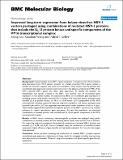| dc.contributor.author | Liu, Meng | |
| dc.contributor.author | Wang, Xiaodan | |
| dc.contributor.author | Geller, Alfred I. | |
| dc.date.accessioned | 2011-03-04T16:16:06Z | |
| dc.date.issued | 2009 | |
| dc.identifier.citation | Liu, Meng, Xiaodan Wang, and Alfred I. Geller. 2009. Improved long-term expression from helper virus-free HSV-1 vectors packaged using combinations of mutated HSV-1 proteins that include the UL13 protein kinase and specific components of the VP16 transcriptional complex. BMC Molecular Biology 10: 58. | en_US |
| dc.identifier.issn | 1471-2199 | en_US |
| dc.identifier.uri | http://nrs.harvard.edu/urn-3:HUL.InstRepos:4737454 | |
| dc.description.abstract | Background: Herpes Simplex Virus (HSV-1) gene expression is thought to shut off recombinant gene expression from HSV-1 vectors; however, in a helper virus-free HSV-1 vector system, a number of promoters support only short-term expression. These results raise the paradox that recombinant gene expression remains short-term even in the absence of almost all (~99%) of the HSV-1 genome, HSV-1 genes, and HSV-1 gene expression. To resolve this paradox, we hypothesized that specific proteins in the HSV-1 virus particle shut off recombinant gene expression. In two earlier studies, we examined the effects on recombinant gene expression of packaging vectors using specific mutated HSV-1 proteins. We found that vectors packaged using mutated UL13 (a protein kinase), or VP16, or UL46 and/or UL47 (components of the VP16 transcriptional complex) supported improved long-term expression, and vectors packaged using mutated UL46 and/or UL47 also supported improved gene transfer (numbers of cells at 4 days). These results suggested the hypothesis that specific proteins in the HSV-1 particle act by multiple pathways to reduce recombinant gene expression. To test this hypothesis, we examined combinations of mutated proteins that included both UL13 and specific components of the VP16 transcriptional complex. Results: A HSV-1 vector containing a neuronal-specific promoter was packaged using specific combinations of mutated proteins, and the resulting vector stocks were tested in the rat striatum. For supporting long-term expression, the preferred combination of mutated HSV-1 proteins was mutated UL13, UL46, and UL47. Vectors packaged using this combination of mutated proteins supported a higher efficiency of gene transfer and high levels expression for 3 months, the longest time examined. Conclusion: Vector particles containing this combination of mutated HSV-1 proteins improve recombinant gene expression. Implications of these results for strategies to further improve long-term expression are discussed. Moreover, long-term expression will benefit specific gene therapy applications. | en_US |
| dc.language.iso | en_US | en_US |
| dc.publisher | BioMed Central | en_US |
| dc.relation.isversionof | doi:10.1186/1471-2199-10-58 | en_US |
| dc.relation.hasversion | http://www.ncbi.nlm.nih.gov/pmc/articles/PMC2709626/pdf/ | en_US |
| dash.license | LAA | |
| dc.title | Improved Long-term Expression from Helper Virus-free HSV-1 Vectors Packaged Using Combinations of Mutated HSV-1 Proteins that Include the UL13 Protein Kinase and Specific Components of the VP16 Transcriptional Complex | en_US |
| dc.type | Journal Article | en_US |
| dc.description.version | Version of Record | en_US |
| dc.relation.journal | BMC Molecular Biology | en_US |
| dash.depositing.author | Wang, Xiaodan | |
| dc.date.available | 2011-03-04T16:16:06Z | |
| dash.affiliation.other | HMS^Medicine-Brigham and Women's Hospital | en_US |
| dash.affiliation.other | HMS^Neurology-Brigham and Women's Hospital | en_US |
| dc.identifier.doi | 10.1186/1471-2199-10-58 | * |
| dash.contributor.affiliated | Liu, Meng | |
| dash.contributor.affiliated | Geller, Alfred I. | |
| dash.contributor.affiliated | Wang, Xiaodan | |


